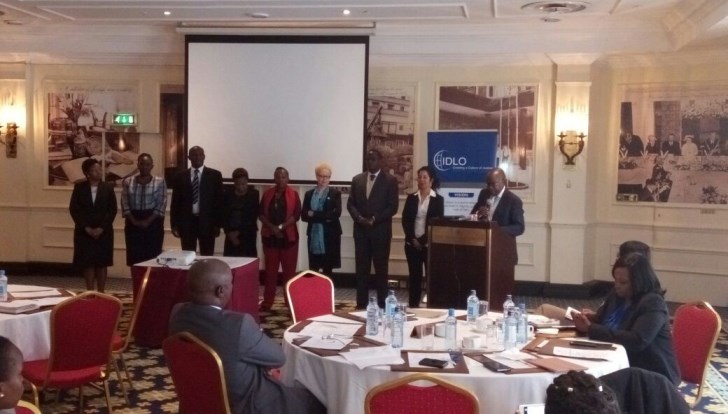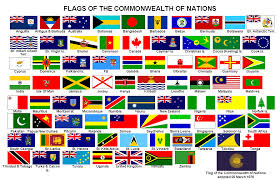By Joan Mutonga
Nairobi.KENYA: On 25th August 2017, ICJ Kenya’s Human Rights Protection Program paid a visit to the Kitui Paralegal Network in Kitui County. This network is among 5 other networks that ICJ Kenya coordinates, namely, Transmara Paralegal Network, Taita Taveta Paralegal Organization, Kwale Paralegal Network, Meru Paralegal Community Based Organization, and Laikipia Legal Forum. These paralegals have increasingly become key stakeholders in the legal aid framework in Kenya through provision of legal assistance, legal advice, legal education and legal information.
The site visits to the 6 paralegal networks by ICJ Kenya is meant to :enhance the capacity of the paralegal networks on their day to day operations including proper administrative, recording and reporting practices; conduct a needs assessment on office items; ascertain the paralegal networks’ membership and operation; conduct a debrief of activities carried out by the paralegal network; establish the challenges faced by the paralegal network and help them identify home-grown solutions; and help them prepare for accreditation as required by the Legal Aid Act.
Over the years, the delivery of legal aid has notably transformed as the paralegals continue to endow the vulnerable, poor and marginalized in the society with legal aid thus enhancing the right to access to justice for all citizens. Access to lawyers in Kenya has been largely hampered not only because of the prohibitive costs that such services represent but also due to the insufficient number of lawyers to address the needs of the people. Paralegals have been useful in bridging this gap by complementing the work done by lawyers and further in provision of alternative methods of dispute resolution.
Accreditation of paralegals under the Legal Aid Act 2016
The Attorney General of Kenya, Prof.Githu Muigai, inaugurates members of the National Legal Aid Service Board on July 31st 2017 at the Sarova Stanley Hotel, Nairobi.
The objective of the Act is to facilitate access to justice and social justice, establish the National Legal Aid Service, provide for legal aid, and funding of legal aid in Kenya. The National Legal Aid Service is established under Part II of the Act and it is the successor to the National Legal Aid and Awareness Program existing immediately before the coming into force of this Act.The service is governed by the National Legal Aid Service Board.
The Act broadly examines the issue of accreditation of legal aid providers as set out under section 56.The Act defines a paralegal as, “A person employed by the Service or an accredited legal aid provider who has completed a training course in the relevant field of study in an institution approved by the Council of Legal Education; The Act goes ahead to define an accredited paralegal as, “A person accredited by the service to provide paralegal services under the supervision of an advocate or an accredited legal aid provider”. Thus a person shall only provide paralegal services unless he/she is accredited by the Board.
Pursuant to Part VII of the Act, in order for one to be an accredited paralegal, he/she needs to make a written application to the Board. The Service is required keep a register of all accredited paralegals which shall include the personal details and contact addresses of all accredited legal aid providers, in the case of a registered association or a public benefit organization, the nature of the association or organization and the particulars of its registration , the nature of services in respect of which the legal aid providers are accredited , the number of cases being handled by the legal aid provider at any given time and any other matter prescribed by regulations.
Key to note is that an accredited paralegal is not entitled to receive any fees for the services rendered and in any event one does so he/ she is liable to be convicted of an offence. The accreditation issued by the service may at any given time be temporarily suspended where the legal aid provider;
a) Is in breach of the code of conduct prescribed under this Act, a code of conduct prescribed by the relevant professional body or under any other written law;
b) Is convicted of an offence;
c) Is subject to disciplinary procedures before the relevant professional body of which he or she is a member; and
d) Has failed to keep proper records of activities undertaken on behalf of an aided person or to provide legal services.
Upon suspension, the accredited paralegal is not entitled to provide any legal aid services or receive payment from the services for the services rendered to an aided person.
Under the Act, the service may also cancel the accreditation issued to an accredited paralegal if it is satisfied that;
a) the accreditation was obtained by mistake, fraud, undue influence or misrepresentation
b) the legal aid provider does not meet the accreditation criteria, whether or not that criteria was adopted before or after the accreditation was given;
c) the legal aid provider is not providing, or has not provided, the service for which they are accredited to the prescribed standard
d) the legal aid provider has been adjudged bankrupt, is insolvent or has entered into an arrangement with his or her creditors
e) the legal aid provider has failed to comply with one or more of the conditions of the accreditation; and
f) the legal aid provider is convicted of an integrity related offence which touches on his or her integrity, accountability, or is subject to an order made under the relevant body.
Upon suspension or cancellation, the accredited paralegal is not entitled to provide any legal aid services or receive payment from the services for the services rendered to an aided person. However such a person may make an application to request the service to review its decision within 14 days of receipt of notice of suspension or cancellation.
ICJ Kenya envisages the existence of an expedient, affordable, reliable and equitable administration of justice. This includes accessible legal aid from the community as the first point of entry in the formal and informal justice systems. ICJ Kenya will continue to support paralegals in Kenya, through the Paralegals Support Network, the umbrella body of organizations working with Paralegals in Kenya, where it is currently its Chair. The objective of the Network is to coordinate activities of like – minded organizations towards promoting the full implementation of the Legal Aid Act and assist in accreditation of legal aid providers as part of ICJ Kenya’s advocacy initiatives, towards ensuring that paralegals conform to the requirements of the Legal Aid Act, 2016.
-END-
Human Rights Protection Program
ICJ Kenya










